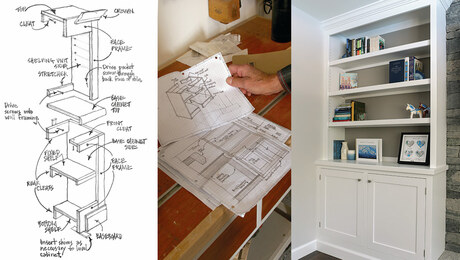*
Help! A very few years ago, we had a retirement house built on the Maine coast. In anticipation of closing it up each winter, I asked the general contractor to freeze-proof the FHW heating system, and he assured me at closing that the plumber added anti-freeze.
Within about two years, every valve in the system (6 zones, lots of valves!) began to seep and drip around the valve stems. The seepage is yellowish-green and slippery to the touch. I have tightened every valve-stem nut, but the seepage is just about out of control. Can you tell me what goes on? Incidentally, the potable water system, hot and cold, shows no leaks or seepage.
Thanks
Bill Jeffrey















Replies
*
I will take a stab...
The valve seats may have some reaction to the antifreeze. Go to a plumbing supply house and explain to them what you need and they should be able to supply the correct seats.
Tom the Tree Guy
*Don't know about anti freeze but the stuff that they sell for RV's works for me and no leaks or stains
*
Bill, I would suspect that you have some foreign junk valves in your system and the packing just can't stand up to the heat. Those are replaceable. I'm not aware of any cases where antifreeze caused deterioration of packings.
*
Try switching to a fiber and graphite packing. Some packings don't last too long at any rate. I am assuming you use regular automotive antifreeze. are there any on the market designed for a system as yours instead of using the auto type?
Pete
*
It almost sounds like he has regular automotive antifreeze in his boiler, but this is definitely not proper since it is a poison and many older systems weren't installed with backflow check valves. A drop in supply water pressure could allow antifreeze to be drawn into the domestic water supply. Special non-toxic antifreezes are made for HW heating systems.
*UPDATE: As suggested, I checked with my local plumbing supply house. Bad news, they think. Auto antifreeze should not be used in a water system, they tell me, because it attacks rubber, thereby destroying the seals in the valves. Incidentally, I am talking about both in-line ball valves from Conbraco Industries (USA) and garden-hose-type drain valves. They tell me that only RecVehicle-type non-toxic antifreeze should be used. The yellow color means auto antifreeze - RV stuff should be red. Can anyone confirm, or suggest a test to determine which is which? All the valves are sweated into 3/4" copper lines, of course, so replacing them is a real chore. The even bigger fear, they tell me, is for the boiler itself, which they tell me is assembled from a stack of separate sections. In my Weil-McLain Gold series, the sections are joined with (you guessed it!) rubber seals, unlike the Burnham burners which have stainless steel seals. Oh, boy, this is starting to sound really expensive.Bill Jeffrey
*Bill, I find it hard to believe that somebody in the trades put that stuff in your boiler, but now I can see why you are having problems. I own a lot of big equipment with diesel engines and you have to put additives in the water/antifreeze mix to prevent the rubber seals in the engine from deteriorating.You are right that you may have a problem with the seals in your boiler itself. Any competent boiler man can get you the right antifreeze (the stuff we use is reddish color) and pump it into the system.
*
Try to get the origional plumber to fix his mistake! Then get the proper antifreeze. The rubber seals in the boiler are more resistant to the auto antifreeze than valve stem seals so you MIGHT be OK there. Good luck
Ron
*
RV anti freeze is propylene glycol which is a non- toxic food grade material. Boilder antifreeze is propylene glycol which is a non- toxic food grade material. The difference between two fuild is the amount of water that is mixed with the propylene glycol (more freeze protection) and the level of corrosion inhibitors that are added. RV fuilds are design to be used a year or less and have more water mixed in. They are cheeper, but you are purchasing reduced freeze protection and fuild lifetime.
Auto antifreeze is ethalene glycol which is toxic and it is illegal to use in a heating system with out there being backflow preventers and double wall heat exchangers
Freeze Testers are available for each fuild
*it's true that antifreeze will corrode only the valves if the are left stagnate
*
Help! A very few years ago, we had a retirement house built on the Maine coast. In anticipation of closing it up each winter, I asked the general contractor to freeze-proof the FHW heating system, and he assured me at closing that the plumber added anti-freeze.
Within about two years, every valve in the system (6 zones, lots of valves!) began to seep and drip around the valve stems. The seepage is yellowish-green and slippery to the touch. I have tightened every valve-stem nut, but the seepage is just about out of control. Can you tell me what goes on? Incidentally, the potable water system, hot and cold, shows no leaks or seepage.
Thanks
Bill Jeffrey